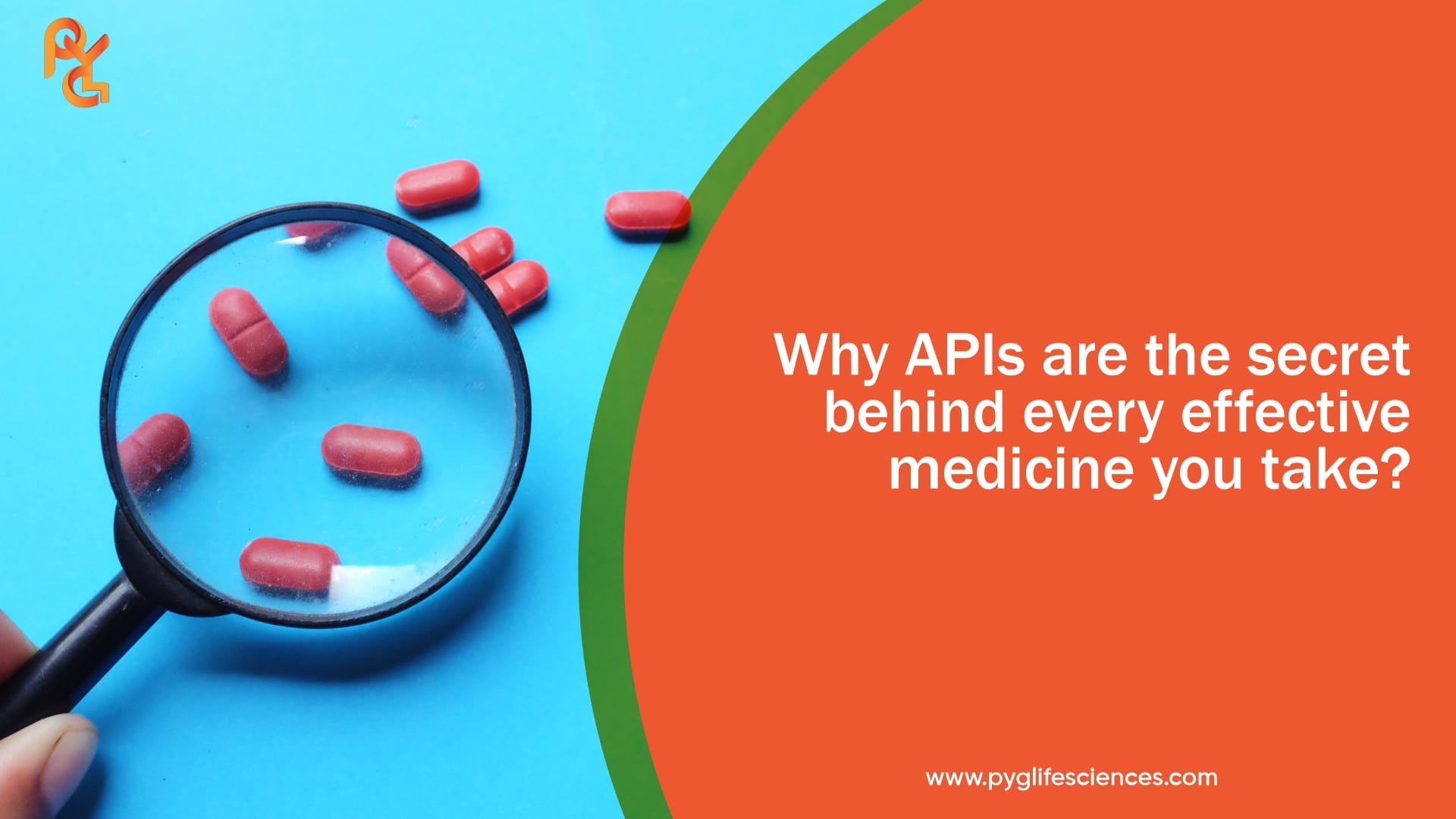8 Applications of Active Pharmaceutical Ingredients (APIs)
Active Pharmaceutical Ingredients (APIs) are the backbone of modern medicine, forming the essential components in drug formulations that treat, manage, and prevent diseases. From pain relievers to advanced cancer therapies, APIs play a critical role in delivering therapeutic benefits.
APIs are active compounds in pharmaceuticals that provide therapeutic effects and targeted action. The pharmaceutical industry depends on high-quality APIs to develop safe and effective treatments for various medical conditions. Their significance extends beyond just medications, impacting innovations in biotechnology, personalized medicine, and vaccine development.
At PYG Lifesciences, we contribute to this evolving landscape by manufacturing high-quality API intermediates and specialty chemicals. With a commitment to sustainability and innovation, we support pharmaceutical companies in creating life-saving drugs that cater to global healthcare needs. By utilizing advanced technology and research-driven solutions in the production of API intermediates, we strengthen India’s position as a hub for pharmaceutical excellence.
In this blog, we will explore the key applications of APIs in the pharmaceutical industry and how they shape modern medicine.
Understanding the Role of APIs in the Pharmaceutical Industry
APIs are categorized based on their therapeutic function, molecular structure, and application in drug formulation. APIs include:
- Synthetic APIs – Manufactured through chemical synthesis, commonly used in traditional pharmaceuticals.
- Biological APIs – Derived from living organisms, including proteins, antibodies, and nucleic acids used in biopharmaceuticals.
- Highly Potent APIs (HPAPIs) – Used in specialized treatments like oncology and targeted therapies.
- Controlled Substances – APIs that require strict regulatory control due to their potency and potential for misuse.
The growing demand for APIs in pharmaceuticals underscores their significance in drug development. Let’s explore the various applications of APIs in the pharmaceutical industry.
8 Key Applications of Active Pharmaceutical Ingredients (APIs) in Pharmaceuticals
1. Prescription Medications
- Cardiovascular Drugs: APIs like atorvastatin and losartan help manage blood pressure and cholesterol levels, reducing the risk of heart disease.
- Diabetes Treatment: Metformin, an API in diabetes medication, helps regulate blood sugar levels.
- Neurological Disorders: APIs such as levodopa (used in Parkinson’s disease) and SSRIs (for depression and anxiety) are essential for neurological health.
APIs contribute to life-saving treatments for infectious diseases, including antibiotics (amoxicillin), antivirals (oseltamivir for flu), and antifungals (fluconazole).
2. Over-the-counter (OTC) Drugs
- Pain Relievers: APIs like ibuprofen and acetaminophen reduce pain and inflammation.
- Cold and Flu Medications: APIs such as pseudoephedrine (decongestant) and diphenhydramine (antihistamine) help alleviate symptoms.
- Antacids: Ranitidine and omeprazole, common antacids, are APIs that manage acid reflux and heartburn.
OTC drugs allow consumers to access effective treatment for minor ailments without a prescription, reinforcing the importance of APIs in pharmaceuticals.
3. Biopharmaceuticals & Biologics
- Monoclonal Antibodies: Used in autoimmune disease treatments and cancer immunotherapy.
- Gene Therapies: APIs help modify or replace defective genes, offering potential cures for genetic disorders.
- Recombinant Proteins: Used in therapies for growth hormone deficiencies and hemophilia.
The pharmaceutical industry applications of biological APIs continue to expand, offering new possibilities for treating previously untreatable conditions.
4. Oncology & Targeted Therapies
- Tyrosine Kinase Inhibitors (TKIs): Used in lung cancer and leukemia treatment.
- Antibody-Drug Conjugates (ADCs): Combine monoclonal antibodies with cytotoxic drugs for precise targeting.
- Hormone Therapies: APIs like tamoxifen help treat hormone-dependent cancers such as breast cancer.
As cancer treatment evolves, APIs in pharmaceuticals continue to play a central role in developing safer and more effective therapies.
5. Vaccines & Immunotherapy
- mRNA Vaccines: APIs like synthetic messenger RNA are used in COVID-19 vaccines.
- Protein-Based Vaccines: Include recombinant proteins to stimulate immune protection.
- Adjuvants: API compounds that enhance vaccine efficacy.
Immunotherapy treatments, including checkpoint inhibitors and cytokine therapies, also utilize APIs to enhance immune system function against diseases like cancer and autoimmune disorders.
6. Personalized Medicine & Gene Therapy
- Genomic APIs: Target specific genetic mutations for customized therapies.
- CRISPR-Based APIs: Enable gene editing for inherited diseases.
- Pharmacogenomics: Helps predict patient responses to medications based on genetic factors.
APIs in pharmaceuticals are revolutionizing healthcare by enabling highly specific, patient-centered treatments.
7. Antiviral and Antimicrobial Medications
- Antiviral APIs: Oseltamivir (for flu), remdesivir (for COVID-19), and acyclovir (for herpes infections).
- Antibacterial APIs: Ciprofloxacin and doxycycline combat bacterial infections.
- Antifungal APIs: Amphotericin B and itraconazole treat fungal infections.
The demand for advanced antimicrobial APIs continues to rise due to the growing threat of drug-resistant pathogens.
8. Hormonal and Endocrine Medications
- Thyroid Medications: Levothyroxine is used to manage hypothyroidism.
- Insulin APIs: Essential for diabetes treatment.
- Corticosteroids: Used in inflammatory diseases and adrenal insufficiency.
Hormonal APIs contribute significantly to improving the quality of life for patients with endocrine disorders.
Final Words
APIs are the essential components that drive the pharmaceutical industry. They are fundamental to creating effective medications. APIs are the core of medical advancement from prescription drugs to personalized therapies, and APIs play an important role. The evolving role of APIs in modern medicine is undeniable. Their applications span a wide spectrum of treatments. This includes chronic disease management, infectious disease control, and advanced therapies.
The pharmaceutical landscape is evolving, and so is the role of APIs. With ongoing research and technological breakthroughs, APIs will continue to drive medical innovation, making healthcare more efficient and accessible for all. At PYG Lifesciences, we are committed to supporting the pharmaceutical industry. We do this by providing high-quality API Intermediates. We believe in the “Make in India, Make for the World” vision. Our team is dedicated to contributing to the growth of the Indian pharmaceutical sector.
